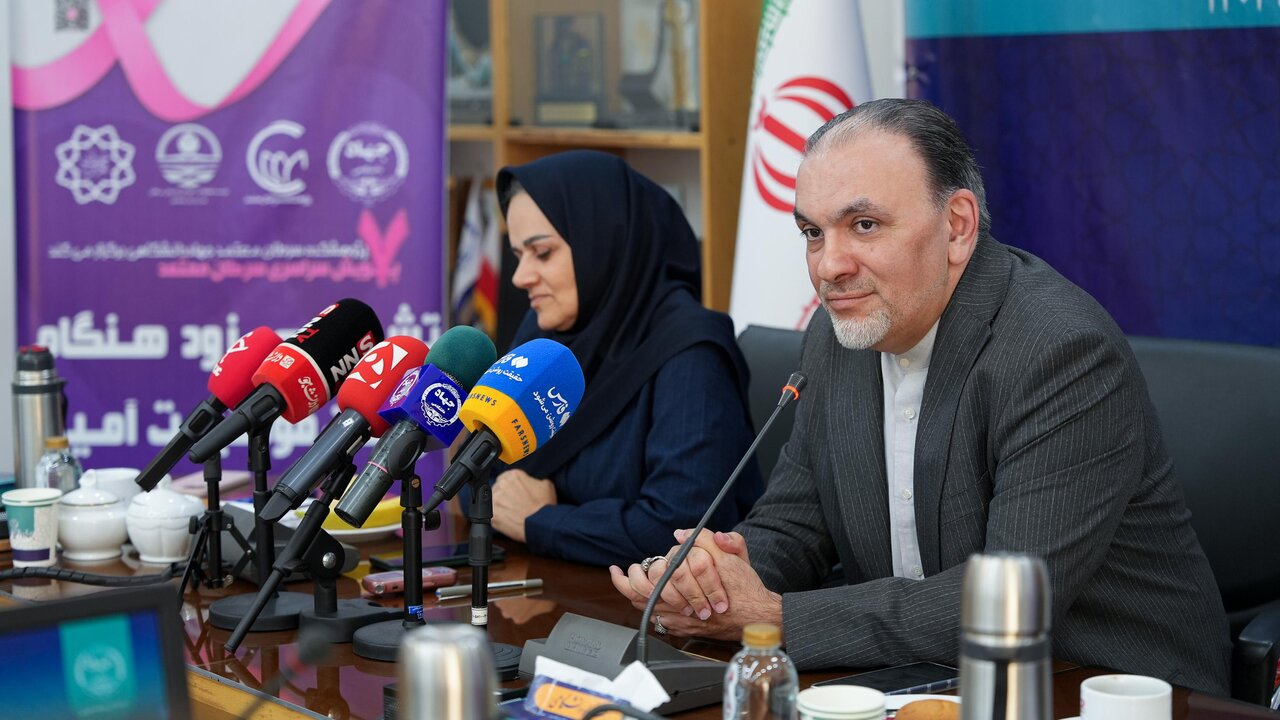National Cancer Institute making strides in improving public health

TEHRAN – The Motamed Cancer Institute, which has recently raised its status to the Iranian National Cancer Institute, continues to make significant steps toward improving the public health and well-being of society.
Dr. Ramin Sarrami-Foroushani, the President of the Motamed Cancer Institute, affiliated with the Academic Center for Education, Culture and Research (ACECR), publicized the center’s elevation to the "Iranian National Cancer Institute", highlighting it as a milestone in improving public health.
He noted that ACECR, by fulfilling its mission to address national challenges and leveraging scientific and technological capacities, continues to take significant strides toward improving the health and well-being of society.
In this regard, a press conference was held on Monday, October 13, on the occasion of Breast Cancer Awareness Month (October) to announce the 7th Nationwide Campaign on Screening for Common Cancers in Women.
The event was attended by Dr. Zahra Sheikhi, Deputy for Research and Technology of ACECR; Dr. Ramin Sarrami Foroushani, President of the Motamed Cancer Research Institute; and Dr. Asieh Olfat-Bakhsh, Deputy for Research and Education of the institute.
Dr. Ramin Sarrami-Foroushani, President of the Motamed Cancer Institute of ACECR, announced that the center has been officially elevated to the status of the Iranian National Cancer Institute, with the support of the ACECR Board of Directors, the Central Headquarters, and the Vice-President of Research and Technology.
He explained that under the new structure, three specialized research centers — the Research Institute for Regenerative Medicine and Advanced Cancer Therapies, the Research Institute for Converging Technologies in Cancer, and the Research Institute for Personalized Medicine and Quality of Life — will operate under the umbrella of the National Cancer Research Institute, comprising around 10 research departments in total.
Sarrami-Foroushani added that this significant achievement is the result of three decades of dedicated efforts by ACECR’s scientists and researchers, expressing hope that with continued support from national authorities, the institute will become a leading national hub for the development of innovative technologies in the field of cancer.
Cancer innovation tower
Elsewhere in his remarks, Sarrami-Foroushani announced the start of construction of the 15-storey cancer innovation tower and advanced therapy ecosystem in Tehran.
He stated that the project has been initiated with the strong support of the Parliament, particularly the Health Commission, as well as the Plan and Budget Organization and the Vice-Presidency for Science, Technology, and Knowledge-Based Economy. Part of the funding has already been secured, and the upper floors of the tower will be dedicated to the production of innovative technologies for advanced cancer treatments.
He emphasized that preserving ACECR’s cultural identity alongside technological development remains a core value of the institute. He added, “While focusing on innovation, we continue to embed cultural principles in all our scientific and health-related initiatives — a hallmark of ACECR’s approach at the Motamed Cancer Institute.”
National program for early cancer detection underway
Sarrami-Foroushani also said that the national program for early cancer detection is being implemented, highlighting the institute’s 30-year experience in cancer screening and diagnosis.
He noted that the institute’s work began nearly three decades ago as a small clinic on Shahid Nazari Street, at a time when the concept of early detection and cancer screening was not widely recognized in Iran.
Today, this mission continues in the form of a comprehensive, scientific, and nationwide program carried out in collaboration with ACECR’s research, healthcare, and cultural divisions.
He went on to say that the National Cancer Research Institute is the outcome of long-term dedication that transformed a small clinic into a national scientific and technological center committed to improving public health.
He also announced the launch of the National Breast Cancer Awareness Campaign, coinciding with Global Breast Cancer Awareness Month (October), stating that the campaign operates across three main axes — promotion, education, and treatment — to deliver tangible and accessible health services to the public.
The campaign includes public awareness activities such as citywide symbolic events, educational workshops for healthcare professionals, and free screening and treatment services for diagnosed patients.
He stressed that breast cancer remains the most prevalent cancer among women worldwide, and early detection greatly improves survival rates while significantly reducing treatment costs. He added that the average tumor size at diagnosis in Iran remains around 32 mm, compared to the global average of 8 mm — underscoring the need for stronger early detection strategies.
He concluded by expressing appreciation for the efforts of researchers, clinicians, cultural experts, and volunteers involved in the nationwide campaign, emphasizing that supporting women through education and early detection is, in fact, supporting the foundation of families and society as a whole.
Leave a Comment